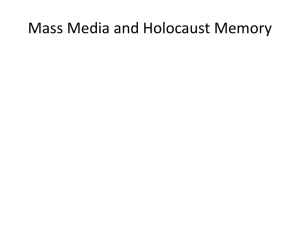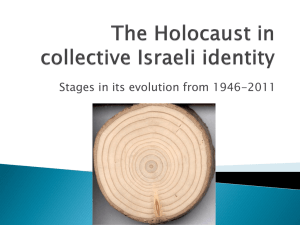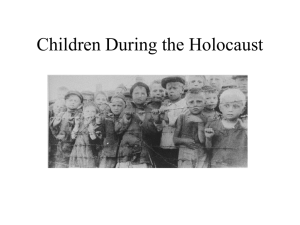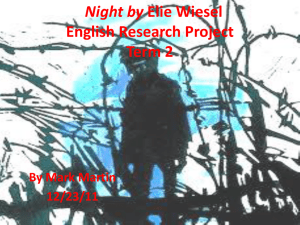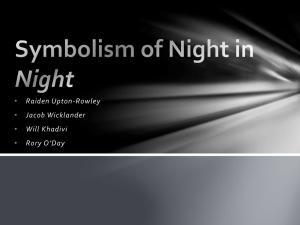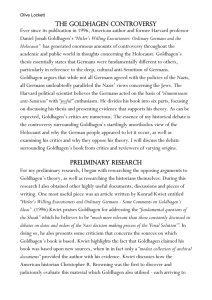Lecture 3. 09.11. Holocaust: Historical Roots
advertisement
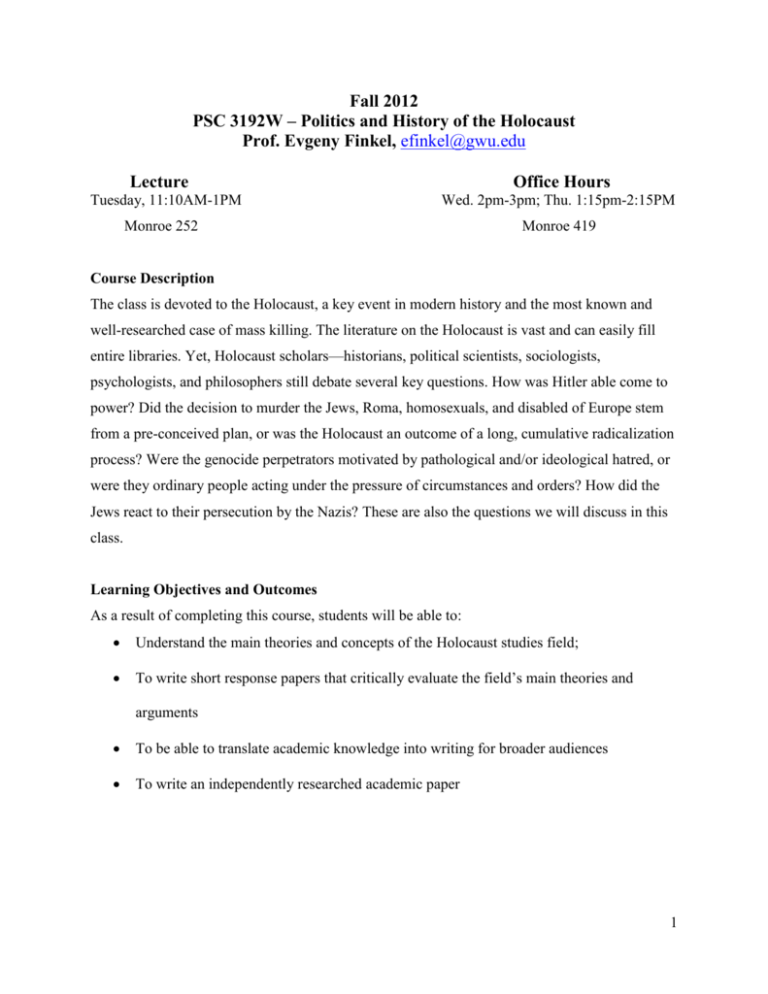
Fall 2012 PSC 3192W – Politics and History of the Holocaust Prof. Evgeny Finkel, efinkel@gwu.edu Lecture Tuesday, 11:10AM-1PM Office Hours Wed. 2pm-3pm; Thu. 1:15pm-2:15PM Monroe 252 Monroe 419 Course Description The class is devoted to the Holocaust, a key event in modern history and the most known and well-researched case of mass killing. The literature on the Holocaust is vast and can easily fill entire libraries. Yet, Holocaust scholars—historians, political scientists, sociologists, psychologists, and philosophers still debate several key questions. How was Hitler able come to power? Did the decision to murder the Jews, Roma, homosexuals, and disabled of Europe stem from a pre-conceived plan, or was the Holocaust an outcome of a long, cumulative radicalization process? Were the genocide perpetrators motivated by pathological and/or ideological hatred, or were they ordinary people acting under the pressure of circumstances and orders? How did the Jews react to their persecution by the Nazis? These are also the questions we will discuss in this class. Learning Objectives and Outcomes As a result of completing this course, students will be able to: Understand the main theories and concepts of the Holocaust studies field; To write short response papers that critically evaluate the field’s main theories and arguments To be able to translate academic knowledge into writing for broader audiences To write an independently researched academic paper 1 Books Snyder, Timothy. Bloodlands: Europe between Hitler and Stalin. New York: Basic Books, 2010 (or any other edition). Stone, Dan. Histories of the Holocaust. Oxford: Oxford University Press, 2011. Goldhagen, Daniel Jonah. Hitler’s Willing Executioners. New York: Vintage 1997 (or any other edition). Browning, Christopher. Ordinary Men. New York: Harper Perennial, 1993. Arendt, Hannah. Eichmann in Jerusalem: A Report on the Banality of Evil (any edition). Dwork, Debórah, and Van Pelt, Robert Jan. Holocaust: A History. New York: Norton 1993. Requirements and Class Policies The class is a seminar. This means that the students are expected to attend the lectures and to read all the required materials. The class is structured around weekly meetings, in which the instructor and the students critically evaluate and discuss the readings. Hence, students’ active participation in the discussions is required and class participation is a substantial part of the final grade. This is a writing-oriented class and the students will be required to conduct various research and writing assignments that culminate in the end-of-class final research paper. In addition, the students will be required to submit three short response papers, and to create a Wikipedia page on a topic, concept, or personality related to their final paper. Response Papers During the semester the students will be required to submit three response papers. The exact dates of the papers will be determined during the first lecture. The goal of each response paper is to critically evaluate the readings that have been assigned for the coming lecture and raise points and questions for the classroom discussion. In addition, the students who wrote the week’s response papers will serve as “discussion leaders” and will present a short summary of their paper at the beginning of the lecture. The response papers should be sent to the class e-mail list no later than Monday at noon (EST). The response papers will be graded and the feedback will help you to proceed with your final research paper. 2 Wikipedia Page To disseminate public knowledge about various aspects of the Holocaust and to help students to translate academic knowledge into writing for broader, non-academic audiences, the students will be required to create a new Wikipedia page on a concept, personality, or idea, related to their final research paper. Additions to or amendments of the existing Wikipedia entries will not be allowed. The topic for the Wikipedia page must be approved by the instructor; topic proposals should be sent to me by the end of Week 9. The students are strongly encouraged to consult me before choosing a topic or during the research for and writing of the entry. The Wikipedia page should we well researched, well written, and properly formatted. The webpage should be ready by Friday 6pm of Week 13 and will be evaluated on that day. The length of the entry will depend on the topic and will be determined by the instructor and the student no later than the end of Week 12. Research Paper The research paper provides you with the opportunity to pursue any analytical, theoretical, or historical question about the Holocaust that interests you. A good paper both informs and persuades; to do this it must be logically organized, clearly argued, well researched, and well documented. Avoid writing a paper that merely restates the readings. You are expected to do some original thinking, research, and analysis in this paper. There are several excellent guides on the web that I encourage you to consult on how to go about writing an analytical research paper. Some good sites include: How to Research a Political Science Paper, by Peter Liberman: http://qcpages.qc.edu/Political_Science/researching.html Writing Political Science Papers: Some Useful Guidelines, by Peter Liberman,: http://qcpages.qc.edu/Political_Science/tips.html Reading, Writing, and Researching for History: A Guide for College Students, by Patrick Rael: http://www.bowdoin.edu/writing-guides/ Writing a Research Paper, by Sarah Hamid: http://owl.english.purdue.edu/workshops/hypertext/ResearchW/index.html An accurate summary of some things not to do, which (unfortunately) students commonly do, can be found at Advice on How to Write a Bad Paper. 3 Paper proposals (about one page) which include the topic, the argument, and at least five relevant sources are due by the end of Week 5; the paper outline and summary (two to three pages EACH? Or is it one paper?) are due by the end of Week 11. Remember, by that time you should also be in an advanced stage of research and writing for the Wikipedia entry. The final paper should be 18-20 pages, double spaced, Times New Roman 12 font (not including bibliography), with one-inch margins. The final papers are due by 5pm on Friday, December 7. Late submission of papers will be penalized by a half of a letter grade for every day of the delay. The paper topic should be approved by the instructor. The students are strongly encouraged to discuss their ideas and progress with the instructor, and I do expect to meet every student at least twice during the class. If you are unable to come to my office hours, I will be happy to schedule a meeting at a different time. Grading Criteria Response Papers: 10% Wikipedia Page: 25% Research Paper: 45% Participation: 20% Academic Conduct I personally support the GW Code of Academic Integrity. It states: “Academic dishonesty is defined as cheating of any kind, including misrepresenting one's own work, taking credit for the work of others without crediting them and without appropriate authorization, and the fabrication of information.” For the remainder of the code, see: http://www.gwu.edu/~ntegrity/code.html Special Needs and Support outside the Classroom Any student who may need an accommodation based on the potential impact of a disability should contact the Disability Support Services office at 202-994-8250 in the Marvin Center, Suite 242, to establish eligibility and to coordinate reasonable accommodations. For additional information please refer to: http://gwired.gwu.edu/dss/ 4 The University Counseling Center (UCC, 202-994-5300) offers 24/7 assistance and referral to address students' personal, social, career, and study skills problems. Services for students include: Crisis and emergency mental health consultations Confidential assessment, counseling services (individual and small group), and referrals 5 Course Outline and Schedule Lecture 1. 08.28: Course Overview and Description Lecture 2. 09.04. Introduction to the Field Snyder, Preface Dwork and Van Pelt, Preface Stone, Introduction King, Charles, “Can There be a Political Science of the Holocaust,” Perspectives on Politics, 10(2), June 2012, pp. 323-341 Snyder, Tymothy, “What We Need To Know About the Holocaust,” New York Review of Books, September 30, 2010 Lecture 3. 09.11. Holocaust: Historical Roots Dwork and Van Pelt, Chapter 1. Stone, Chapter 5. Benjamin Madley, “From Africa to Auschwitz: How German South West Africa Incubated Ideas and Methods Adopted and Developed by the Nazis in Eastern Europe,” European History Quarterly, 2005, 35(3), pp. 429-464. Voigtländer, Nico, and Voth, Hans-Joachim, “Persecution Perpetuated: The Medieval Origins of Anti-Semitic Violence in Nazi Germany,” Quarterly Journal of Economics, forthcoming. Lecture 4. 09.18. The Nazi Takeover Dwork and Van Pelt, Chapters 2 and 3. Snyder, Introduction. King, Gary et al., “Ordinary Economic Voting Behavior in the Extraordinary Election of Adolf Hitler,” Journal of Economic History, 68(4), 2008, pp. 951-996. Berman, Sheri, “Civil Society and the Collapse of Weimar Republic,” World Politics, 49(3), 1997, pp. 401-429. Lecture 5. 09.25. Germany, the Jews, and the World 6 Snyder, Chapter 3. Dwork and Van Pelt, Chapters 4 and 5. Norwood, Stephen, “Legitimating Nazism: Harvard University and the Hitler Regime, 1933-1937,” American Jewish History, 92(2), 2004, pp. 189-223. **PAPER PROPOSALS ARE DUE BY THE END OF THE WEEK** Lecture 6. 10.02. Killings: Beyond Germany and Auschwitz Snyder, Chapters 4 and 5 Jeffrey Kopstein and Jason Wittenberg, “Deadly Communities: Local Political Milieus and the Persecution of Jews in Occupied Poland,” Comparative Political Studies, 2011, 44(2), pp. 259-283. Dumitru, Diana, and Johnson, Carter, “Constructing Interethnic Conflict and Cooperation: Why Some People Harmed Jews and Others Helped Them during the Holocaust in Romania,” World Politics, 63(1), 2011, pp. 1-42. Lecture 7. 10.09. Final Solution: Functionalism vs. Intentionalism Snyder, Chapter 6. Stone, pp. 64-77. Browning, Christopher, Initiating the Final Solution: The Fateful Months of September– October 1941, available on-line at: http://www.ushmm.org/research/center/publications/occasional/2003-05/paper.pdf Longerich, Peter, Policy of Destruction Nazi Anti-Jewish Policy and the Genesis of the “Final Solution” available on-line at: http://www.ushmm.org/research/center/publications/occasional/2001-05/paper.pdf Lecture 8. 10.16. Jewish Life Under the Nazi Occupation Michman, Dan, The Emergence of Jewish Ghettos During the Holocaust, New York: Cambridge University Press, 2011, Chapters 1, 6, and 7. Browning, Christopher, Ghettos 1939-1945, pp. 1-13, available on-line at: http://www.ushmm.org/research/center/publications/occasional/2005-08/paper.pdf 7 Weiss, Aharon,”Jewish Leadership in Occupied Poland. Postures and Attitudes,” Yad Vashem Studies 12/1977, pp. 335-365. Dwork and van Pelt, Chapters 8 and 9. Lecture 9. 10.23. Perpetrators I Arendt (the whole book). Stone, Chapter 1 and pp. 95-111 in Chapter 2. **WIKIPEDIA PAGE TOPICS ARE DUE BY THE END OF THE WEEK** Lecture 10. 10.30. Perpetrators II Browning, Ordinary Men (the whole book). Goldhagen, Introduction, Chapters 3, 6-9, 15-16. The “Willing Executioners”/ “Ordinary Men” Debate, available on-line at: http://www.ushmm.org/research/center/publications/occasional/1996-01/paper.pdf Lecture 11. 11.06. Death Camps Maher, Thomas, “Threat, Resistance, and Collective Action: The Cases of Sobibór, Treblinka, and Auschwitz,” American Sociological Review, 75(2), 2010, pp. 252-272. Dwork and Van Pelt, Chapters 11, 14. Snyder, Chapter 8. Goldhagen, Chapters 13-14. **PAPER OUTLINES ARE DUE BY THE END OF THE WEEK** Lecture 12. 11.13. Post-Holocaust Olick, Jeffrey, and Levy, Daniel, “Collective Memory and Cultural Constraint: Holocaust Myth and Rationality in GermanPolitics,” American Sociological Review, 62(6), 1997, pp. 921-936. 8 Acemoglu, Daron, Tarek, Hassan, and James Robinson, “Social Structure and Development: A Legacy of the Holocaust in Russia,” The Quarterly Journal of Economics, 126(2), 2011, pp. 895-946. Grosfeld, Irena, Rodnyansky, Alexander, and Ekaterina Zhuravskaya, Persistent AntiMarket culture: The Legacy of the Pale of Settlement and the Holocaust, CEFIR / NES Working Paper series, Working Paper 145, 2011. Voigtländer, Nico, and Voth, Hans-Joachim, (Re-) Shaping Hatred: Anti-Semitic Attitudes in Germany, 1890-2006, Unpublished Manuscript **THE WIKIPEDIA PAGE DETAILS SHOULD BE FINALIZED BY THE END OF THE WEEK** Lecture 13. 11.20. One-on-One meetings with the students to discuss the research papers and the Wikipedia pages **THE WIKIPEDIA PAGE IS DUE BY THE END OF THE WEEK** Lecture 14. 11.27. What We Still Don’t Know About The Holocaust And What Are We Doing About It? Roundtable Discussion With The Center For Advanced Holocaust Studies Researchers And Fellows (exact details will be provided later) 12.04 – No Lecture – Designated Monday. 12.07 - RESEARCH PAPERS ARE DUE 9



